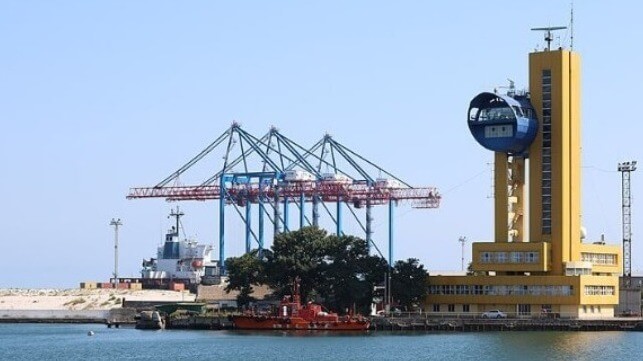Ukrainian Commercial Ports Closed After Russia Reports Ships Attacked

Ukrainian officials announced within hours of Russia’s attack that they had ordered all the country’s commercial seaports closed while Russian officials also reported that the Sea of Azov in the Crimea was also closed to all commercial traffic. The closing of the ports came as security analysis warned of the dangers to commercial ships and Russia’s Federal Security Service issued an unsubstantiated report that two of its commercial ships had been attacked.
The Krasnodar Department of Russia’s State Border Service issued the report saying that two small commercial ships registered in Russia had been attacked by the Ukrainian Armed Forces. The vessels were identified as a 1981-built oil and ore carrier, the SGC Flot (3,345 dwt), and a 1986-built general cargo ship the Seraphim Sarovskiy (3,878 dwt). AIS data reflects both vessels as underway in the Sea of Azov inbound to ports in the region Russia annexed in the Crimea in 2014. The Russian reports said both vessels were damaged with a small fire starting on the SGC Flot and one crew member injured.
Citing the attacks, Russia said that all commercial shipping was now suspended to the Crimea while emphasizing that its Black Sea ports remained open and were functioning normally. Closing of the Sea of Azov is seen as less consequential as they are smaller, shallow ports used mostly for transshipping. Russia, however, Reuters reports has been shipping wheat, barley, and corn from Crimea to countries including Cyprus, Egypt, Italy, Lebanon, and Turkey.
Global markets are however working to access the full impact of the closing of the Ukrainian ports along the Black Sea. The country is a large exporter of gains as well as metals and steel, all of which will be impacted. Among the major exports coming from Ukraine are corn, wheat, and barley, as well as sunflower oil. The ports also service the metals industry shipping Bloomberg estimates 60 percent of Ukraine’s ferrous metals exports as well as the country’s steel production.
Collective, Reuters estimates that Ukraine and Russian combined account for nearly 30 percent of the global wheat exports and nearly 20 percent of corn exports. The two countries make up the majority of the world’s sunflower oil exports.
Yesterday, the government of Ukraine had reported that it was asking Turkey to close the Bosporus to combatant vessels. Turkey has not officially responded, but analysts warned of the potential dangers for all commercial ships in the region.
Security analysts Dryad Global issued a statement saying, “As the situation develops, there remains a high degree of uncertainty regarding the freedom of navigation throughout the wider Black Sea.” They warned that “Any vessel currently within Ukrainian ports should seek to leave immediately if deemed safe to do so.” Dryad further advised, “all commercial operators to avoid any transit or operation within the EEZ of Ukraine or Russia within the Black Sea.”
The global shipping industry has been quick to respond to the attack and the fears at ports along the Black Sea. Both Maersk and Hapag-Lloyd immediately reported that they had closed their offices in Ukraine with Maersk saying all port calls were suspended on their two service routes at least till the end of the February and greater clarity emerged.

that matters most
Get the latest maritime news delivered to your inbox daily.
Top photo by George Chernilevsky (public domain photo)
